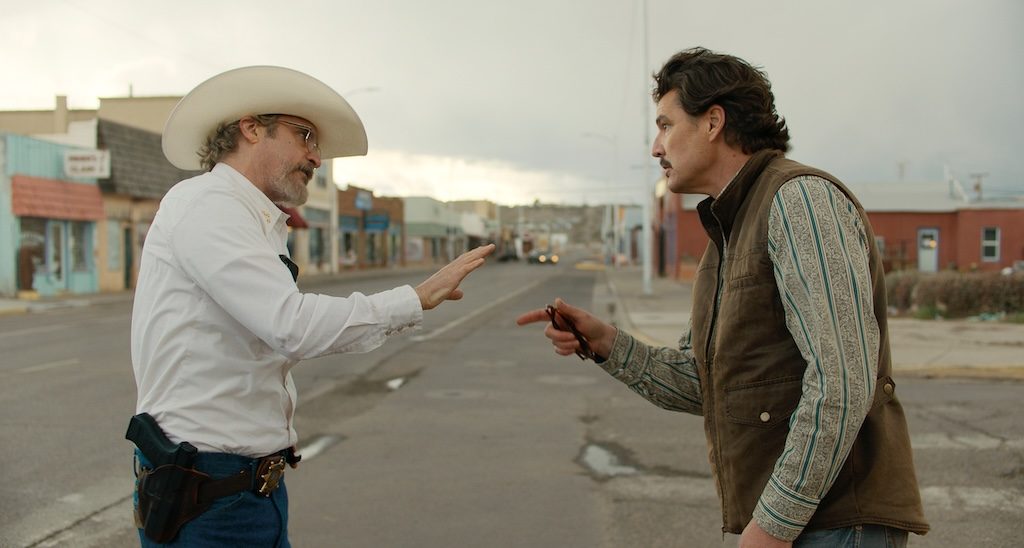Eddington: Ari Aster’s Post-Pandemic American Western Film

Of all the films that have attempted to address the chaos, conflicts, and contradictions of pandemic-era America, few have done so with the darkly comic and sheer audacity of Ari Aster’s Eddington. Already divisive among critics and audiences at loggerheads over what the filmmaker truly wants to express, the film is a crucial addition to Aster’s cinema slate.
America’s real and imagined divisions become both narrative and structural metaphor as tribes argue over the very nature of reality on both sides of the spectrum.
Setting the Scene: Eddington as Pandemic Microcosm
Set in small-town Eddington, New Mexico during the height of the 2020 pandemic, Eddington centers on Joaquin Phoenix’s Sheriff Joe Cross, a local under-resourced lawman desperate to maintain order without a playbook.
When an unpopular mask mandate provokes outrage, conspiracy, and civil unrest, a community dispute spirals into a violent, absurd, and deeply satirical clash. The town is sharply divided into believers and non-believers with scant regard for medical facts. Beliefs matter more.
Eddington toggles between farce and tragedy as the town descends into a black hole of mass hysteria. A post on social media carries the same weight as a peer-reviewed scientific journal. If can’t see that, then you’re part of the deep state problem.
The last time America has seen such deep distrust, suspicion and irrational finger-pointing may have been the during the Red Scare or the Satanic Panic.

Ari Aster
Aster has called the film “a fever-dream of America,” a place where “everybody senses something is wrong, but nobody can agree what it is.” However, we can all agree that Aster is entirely to blame for pitting neigbor against neighbor because he wrote the screenplay for Eddington while quarantined in New Mexico.
He observed, “this fissure in the community’s sympathy. People were constantly debating if they owed their neighbor anything.” This landscape of suspicion, fear, and conflicting reality—exacerbated by social media strict echo chambers—is the emotional heart of Eddington. Who do you believe? Who do trust? Who tells the truth? Answer: Yourself. And don’t let anyone from the deep state tell you otherwise.
Tonal Juggling: Horror, Satire, and Cultural Chaos
Eddington often feels like a Western filtered through the anxious absurdity of the lockdown era and the fragmented media landscape of the 2020s. Facts are unfiltered and gush in without a safety valve to regulate information.
Satire, horror, and hyperrealist drama co-exist uneasily, with earnest slapstick and violence. This is no accident: “It’s about a bunch of people living in different realities who are unreachable to each other,” Aster explains. “If we come out of the movie a little confused or feeling like all the ideas are jumbled, that’s intentional. It’s meant to mirror how it feels to live in America right now.”

Joe Cross (Joaquin Phoenix) & Ted Garcia (Pedro Pascal) Photo courtesy of A24 films
The shifting tones, deadpan humor, and choking claustrophobia purposefully destabilizes the audience. The story progresses with a distracted narrative thread. Setups are not always paid off – they are addressed with more setups, story overlaps, and delayed plot progression. There are no discernable heroes or villains. Everyone is yelling at each other as they march to the beat of their own idealogical drums. Until Sheriff Joe Cross reaches his breaking point. Eddington is an atmospheric cauldron of ingredients simmering away until it overflows onto the town like lava.
Living in Different Realities: Narrative as Social Allegory
Aster’s sprawling narrative layers paranoia, misinformation, and escalating violence. The film’s many plotlines—feuds between neighbors, rogue militias, bitter social media skirmishes—are “really just training data… the movie itself is training data,” says Aster. For the filmmaker, the theme is not just institutional collapse, but the deeper story of “people warring with each other, stuck in ideological battles, but also stuck in these petty personal battles, distracted from what’s happening with big power.”
He’s explicit about the corrosive effect of our algorithm-chosen realities on the fabric of society: “Social media is a tool. It’s the way that it’s been harnessed. What you’re seeing in the algorithm is being dictated by somebody. Somebody is showing you a stream of information, and based on that, can determine a lot about how you feel and the way you engage in reality.”
The constant shifting of perspective and reality in Eddington—its collisions of fact, rumor, and hallucination—are designed to feel “dizzying,” as Aster puts it, “as a way of reflecting modern experience.”
None of the online and offline squabbling surprises Aster. Everyone’s an expert. “We knew it was gonna be divisive. It’s about polarization; it’s about division. We tried to pull back as far as we could to have it be about the environment where everybody is kind of in one way or another, missing part of the picture,” he admits.
Ari Aster’s Philosophy: Empathy vs. Escapism
Aster approaches Eddington not as a message film, but as an “empathy machine,” in the spirit of Ebert. He doesn’t take sides and each political extremity takes the same number of swipes at each other.
“I believe in escapism; I hope my movies are fun and enjoyable, and don’t just feel like work… Any film that’s trying to achieve any sort of modern realism has to contend with our division and how those voids are only getting wider.” The intent, he maintains, is not to tell audiences what to think: “It wasn’t meant to reflect one singular ideology, but rather to embrace complexity and diversity.”
With Eddington, Aster doesn’t tidy up America’s pandemic-era madness at the end. There is no conclusion or moral to the story. He doesn’t ask why we can’t all just get along and respect each other’s differences. He hands it to us raw, slippery, and kaleidoscopic—a warning, a provocation, a smack in the face, and, above all, an inspiration.
Join the Discussion!
Related Articles
Browse our Videos for Sale
[woocommerce_products_carousel_all_in_one template="compact.css" all_items="88" show_only="id" products="" ordering="random" categories="115" tags="" show_title="false" show_description="false" allow_shortcodes="false" show_price="false" show_category="false" show_tags="false" show_add_to_cart_button="false" show_more_button="false" show_more_items_button="false" show_featured_image="true" image_source="thumbnail" image_height="100" image_width="100" items_to_show_mobiles="3" items_to_show_tablets="6" items_to_show="6" slide_by="1" margin="0" loop="true" stop_on_hover="true" auto_play="true" auto_play_timeout="1200" auto_play_speed="1600" nav="false" nav_speed="800" dots="false" dots_speed="800" lazy_load="false" mouse_drag="true" mouse_wheel="true" touch_drag="true" easing="linear" auto_height="true"]










You must be logged in to post a comment Login